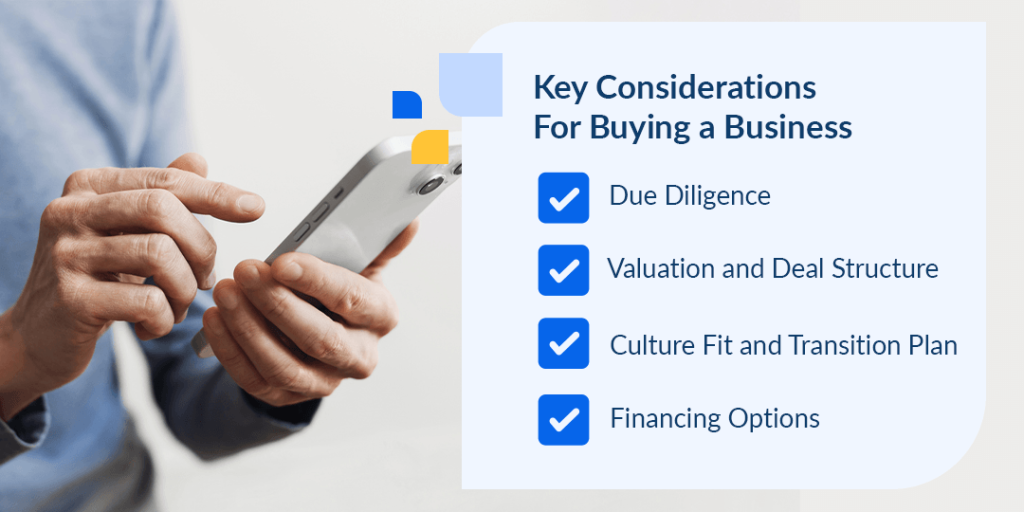
Blake Taylor
What Is the Best Way to Sell a Profitable Business?
Selling a profitable business is one of the most significant financial decisions you can make as a business owner. A …
7 MIN READ
Read More

Imagine this. You have spent years in a corporate job, saving, investing, and building skills. Now, you are ready for more control over your income and time. Or maybe you are an existing business owner looking to expand your portfolio. Buying an existing business can be a smart shortcut to entrepreneurship.
There are many things to consider before buying a business to be sure it’s right for you. The process of buying a business can be an intimidating task that might take months of checking, calculating, negotiating, and finally documenting. Whether you are a seasoned entrepreneur or transitioning from a corporate role, buying a business is a move that requires strategic thinking, financial clarity and emotional intelligence.
Buying a business can be life-changing, but it is not a shortcut. You need to be strategic, have clarity and courage and exercise strong due diligence. While the right deal can fast-track your goals, it is important to fully understand the nuances of buying an existing business.
Buying an existing business can be one of the fastest ways to become your own boss. Instead of starting from scratch, you step into a business with customers, cash flow, employees and operational systems in place. For many entrepreneurs, this can significantly reduce the risk and timeline typically associated with startups. If the business is well-run and profitable, you are buying time, trust and momentum. Additional benefits include:
While buying an existing business comes with built-in advantages, it is not without challenges. Beneath the surface, you may find outdated systems, high employee turnover or financial inconsistencies. Without due diligence, what looks like a turnkey opportunity can turn into an expensive learning curve. Understanding the potential drawbacks is critical to making a smart, informed investment. Some of the cons include:
Before you start to browse businesses, understand your motivation. Buyers typically fall into four categories, and knowing who you are will help you determine what to prioritize in a business: cash flow, synergy, passion, or lifestyle. Types of buyers include:
Industry buyers: Industry buyers are out to acquire or merge with direct competitors. Industry buyers vary significantly in what they are willing to pay for a business. Some may pay a premium and can leverage the company they are buying to help it grow. Others may just be looking for a bargain basement price.
Individual buyers: These are career switchers or entrepreneurs who want to run the day-to-day operations of a business. They are often looking for more autonomy or to align business with personal values. For them, the business-buying process can be emotional, and they tend to buy into smaller ventures. If this is you, focus on minimal risk and an operation that is easy to understand.
Financial buyers: These are investors looking for solid returns. Think of private equity groups (PEG) or individuals who want own a business as a passive investor. They are less emotional and highly analytical, as they prioritize the return on investment (ROI). If you relate to this, look for a business with a strong management team and high earnings before interest, taxes, depreciation and amortization (EBITDA).
Strategic buyers: A strategic or synergistic buyer already owns a business. They are looking to grow, diversify or gain a competitive edge. These buyers are more likely to pay a higher price if the seller’s company operations are not easy to replicate. If you are a strategic buyer, work with a mergers and acquisitions broker to get access to a vetted business.

Whether you are pursuing a passion, looking to diversify your income or stepping into entrepreneurship for the first time, it is essential to look beyond surface-level appeal. From financials and operations to culture and risk, you need to know what to consider when buying a small business. Several factors can determine whether a deal sets you up for success or becomes a costly misstep. Understanding what to evaluate and why it matters will help you make a confident, informed decision.
Due diligence means doing your homework. You are buying a business’s assets, liabilities, relationships and reputations. Working with a broker or your mergers and acquisitions lawyer, review the company’s financials, legal, operations and market. You want to ensure the industry is stable or growing, that the business is free of potential lawsuits and that there is a steady flow of income with little to no debt for you to inherit.
Your risk increases significantly if a seller cannot provide clean books or mostly relies on cash transactions. Also, keep an eye on the customer concentration, supplier concentration, and business model risks like market vulnerabilities and customer due diligence. The latter refers to suspicious financial activities.
Valuation can be complex. Most businesses are priced on a multiple of earnings to help calculate a business’s worth and set a potential offer. Well-documented financial statements and tax returns are essential to demonstrate the company’s earnings strength. It also makes it easier to have an updated record for legal proceedings, such as audit investigations. Valuation involves determining the true value of a business and measuring its earnings before interest and taxes. Therefore, it’s a roadmap for future developments in your business.
A market-based approach involves comparing similar private or public companies’ pricing multiples to measure the current performance of the business, but the challenge is to rightly compare oranges with oranges. Also, keep in mind what makes a business valuable: consistent financial performance, growth potential and a competitive advantage that puts it in a strong market position. Additionally, if it has strong customer relationships, intellectual property assets like patents, a skilled workforce and diversified revenue streams, you may be on the right track.
The deal structure also matters. You may not pay the full amount upfront, as you can negotiate for seller financing, earnouts and performance-based payments. However most sellers want as much money up front and guaranteed, so you have to be mindful of what you can negotiate with a given seller.
Insist on a transition period with the previous owner. Even if the numbers work, cultural mismatch can be a big challenge. You need to establish whether or not:
Buying a business does not always require an all-cash investment. You can consider applying for a Small Business Administration (SBA) loan, which is backed by the government and often requires less upfront capital. Alternatively, the seller can become the lender through seller financing. This model shows the seller’s confidence in the business. Finally, you can consider investor partnerships by bringing in capital partners.
A wise businessman knows that the search for a private business takes diligence, patience, a professional advisory team, and street smarts. Still, in the end, smartness is extracting value from the companies they buy. On top of it, you need to get an advisory team to evaluate the accurate information in a timely manner — after all, it might be the savings of your life, so even a slight mistake or misinterpretation can have you paying a high price above the market value of the business. Hopefully, this article has provided you with some useful information on buying a business.
Synergy Business Brokers is a mergers and acquisitions firm that helps entrepreneurs sell their companies. We calculate a recommended asking price and handle marketing while also assisting in deal negotiations with interested buyers. Our more than 20 years of experience have taught us to focus on specific industries and a limited number of companies. This operational structure gives us the expertise and dedication to see each sale through.
To get started, view our businesses for sale and then fill out our online NDA for whichever businesses you are interested in.
